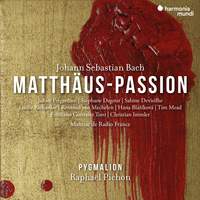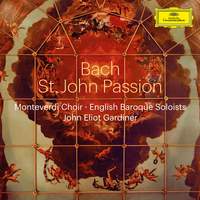Recording of the Week,
Bach's St Matthew Passion from Raphaël Pichon
A few years ago I was impressed by Ensemble Pygmalion’s thoughtful recording of Bach’s six motets, which saw conductor Raphaël Pichon tease out the ancestry that helped shape them, all the way back to Venetian cori spezzati works by Giovanni Gabrieli. That recording was on my mind again as I listened to Pichon’s long-awaited, and long-prepared, account of the St Matthew Passion. Not only is the antiphonal legacy apparent in the use of two opposed choirs and orchestras, but there’s a sense throughout the performance that Pichon is approaching even this intimidatingly-proportioned work with half an eye on those motets as his reference-point.
 There’s a muted sound to the opening chorus; the voices’ first entry slides into the orchestral texture rather than making its presence immediately felt. Pichon contrasts the St Matthew with the “grabbing by the scruff of the neck” of the more directly theatrical St John; both he and his sensitive Evangelist Julian Prégardien refer in the sleeve notes to their desire to avoid the excesses of melodrama which they see in the more theatrical Passions of Bach’s contemporaries, and more recently in Mel Gibson’s controversial film The Passion of the Christ.
There’s a muted sound to the opening chorus; the voices’ first entry slides into the orchestral texture rather than making its presence immediately felt. Pichon contrasts the St Matthew with the “grabbing by the scruff of the neck” of the more directly theatrical St John; both he and his sensitive Evangelist Julian Prégardien refer in the sleeve notes to their desire to avoid the excesses of melodrama which they see in the more theatrical Passions of Bach’s contemporaries, and more recently in Mel Gibson’s controversial film The Passion of the Christ.
Subtle echo effects, here and elsewhere, bring variety to the texture; perhaps a distant connection to the heritage of the motets is at work here, too. Pichon is also not afraid to introduce some expressive hairpins (for instance in the chorale interjections in the tenor arietta O Schmerz) that lend an almost Romantic air to certain passages. It’s the same story in the chorales proper, which are here far more than mere hymn-like congregational items; rather, Pichon moulds them like miniature motets, with wide dynamic and emotional ranges. The final appearance of the Passion Chorale, Wenn ich einmal soll scheiden, creeps in out of a barely-audible sotto voce in the aftermath of Prégardien pronouncing Jesus’s death. Meanwhile, many of the turba choruses lean towards hurried conspiratorial whispering – Ja nicht auf das Fest, Was gehet uns das an and others.
Indeed, Pichon tends towards faster tempi in general; So ist mein Jesus nun gefangen is a particularly prominent example, taken in a brisk two rather than four. However much I might want to take more time to savour Sabine Deveilhe and Lucile Richardot’s spine-tingling duet, Pichon rightly recognises that such indulgence is out of place at the tense moment of Jesus’s arrest. There’s a real sense of anxiety which slower, more luxurious tempi lack. It also pushes the intensity of Sind Blitze, sind Donner almost to breaking point (and the chorus deserve immense credit for retaining clarity of diction at this speed, spitting out clusters of Germanic consonants with perfect accuracy).
The two most beloved arias in the St Matthew Passion – Erbarme dich and Mache dich, mein Herze, rein often take on an importance out of proportion to their significance within the work; and what singer would not want to make the most of the spotlight for these hallowed numbers? Lucile Richardot’s Erbarme dich is gently enlivened by subtle spread chords from the theorbo, which makes its presence known in the continuo at various other points – a far from unwelcome touch and one that again emphasises the more intimate aspects of the St Matthew that are often obscured by its sheer orchestral scale. She takes a fairly simple approach – minimal ornamentation and a sense not so much of impassioned grief but of world-weariness, perfectly matched by obbligato violinist Sophie Gent. Baritone Stéphane Degout is believably vulnerable in Komm, süßes Kreuz – a light, almost tenor-like sound that doesn’t try, as some have, to recapture in music the laboured steps of Jesus hauling the Cross – and similarly sensitive in the sublime stillness of Am Abend, da es kühle war. Even his approach to Mache dich, when it comes, feels light-footed; a lilting tempo that wastes no time.
Amid so many accounts of the St Matthew Passion over the years that have reached for the stars with sweeping, operatic drama, Pichon’s deliberately does the opposite. Early Music America’s Thomas May described the performance as possessing an “implacable yet transparent urgency”, and I hope he won’t mind my borrowing his phrase. Shorn of any pretentions, one of the most emotive stories ever told re-emerges with focus and clarity.
In the light of such praise for Pichon’s self-effacing directness, I trust readers won’t take my earlier allusion to the St John Passion as a more intentionally dramatic work as implying its inferiority; but happily, anyone who wishes to judge for themselves can do so, as a new St John has also just been released, with John Eliot Gardiner returning to the work in a new performance recorded and videoed on Good Friday 2021 as his first live concert after a pandemic-enforced hiatus.
Julian Prégardien (Evangelist), Stéphane Degout (Christus), Sabine Devieilhe & Hana Blažiková (sopranos), Lucile Richardot (mezzo), Tim Mead (countertenor), Reinoud Van Mechelen & Emiliano Gonzalez Toro (tenors), Christian Immler (bass-baritone), Pygmalion, Raphaël Pichon
Available Formats: 3 CDs, MP3, FLAC, Hi-Res FLAC
Nick Pritchard (Evangelist), William Thomas (Christus), Alex Ashworth (Pilatus), Julia Doyle (soprano), Alexander Chance (countertenor), Peter Davoren (tenor)
English Baroque Soloists, Monteverdi Choir, Sir John Eliot Gardiner
Available Formats: MP3, FLAC, Hi-Res FLAC




